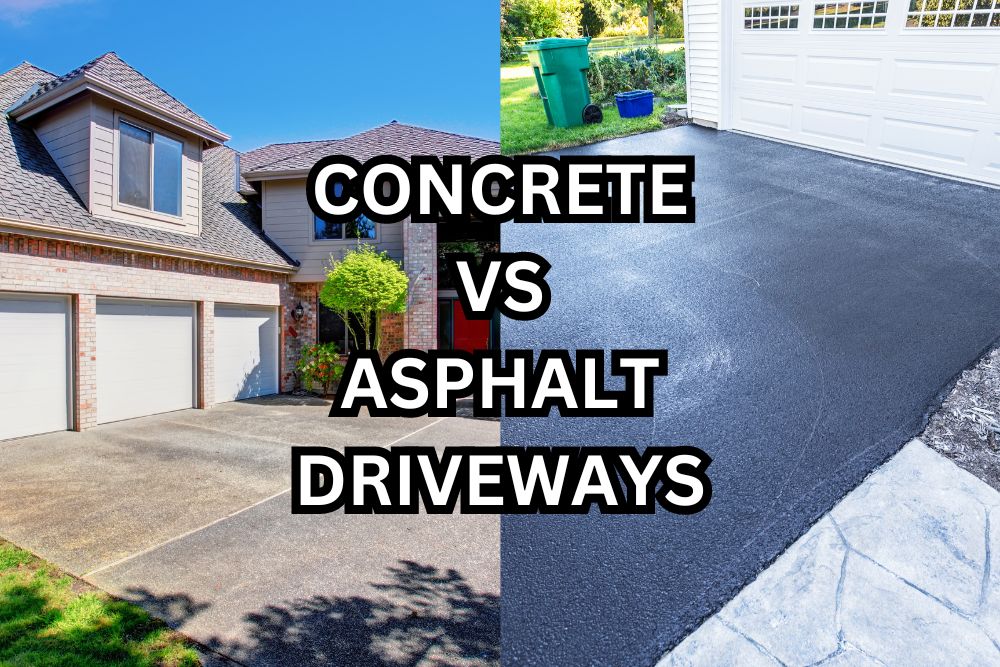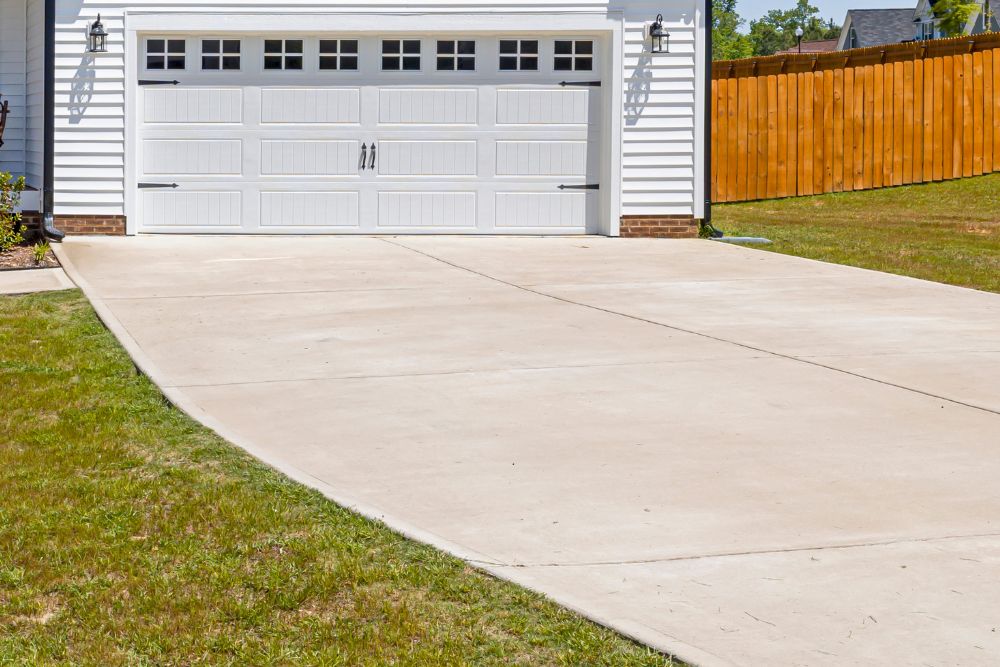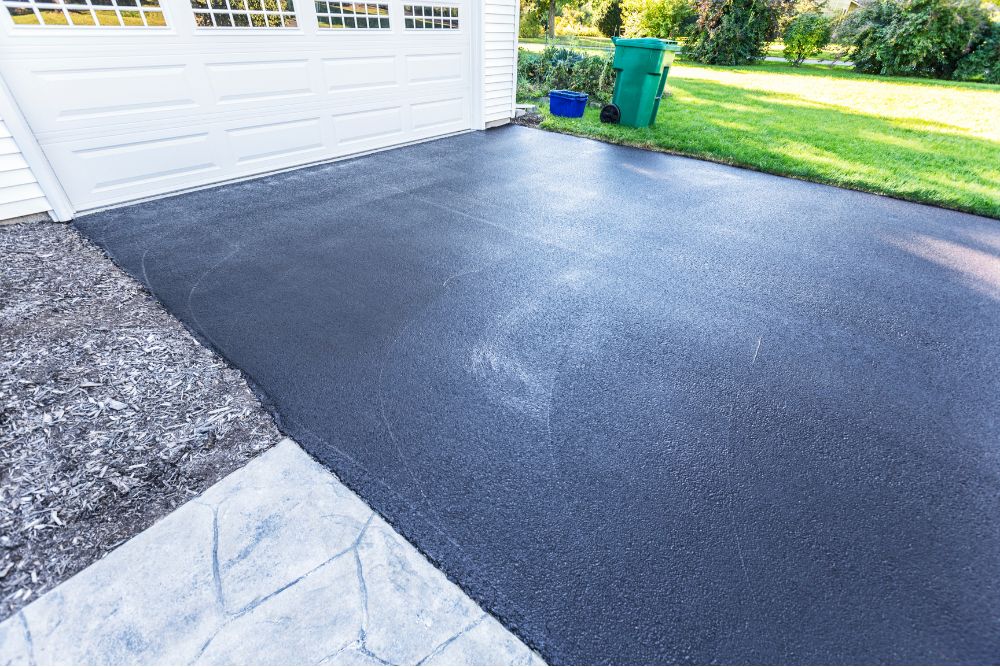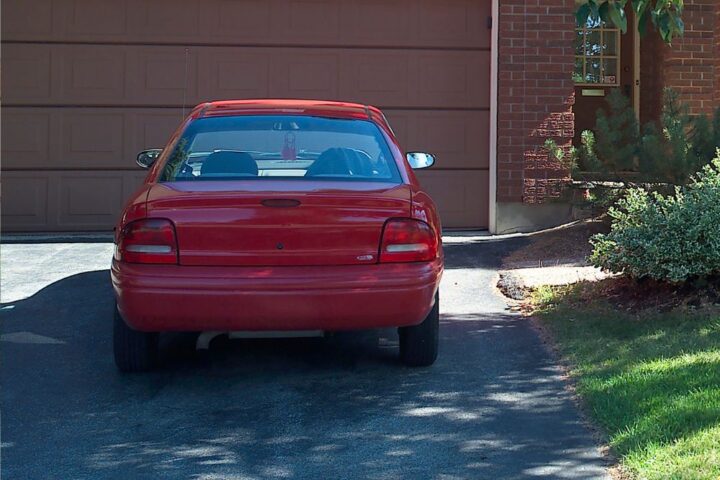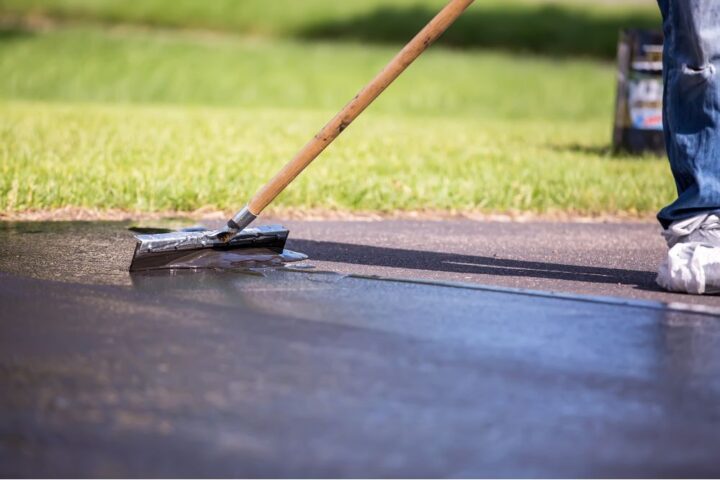When it comes to selecting a driveway material for your Melbourne home, the choice between asphalt and concrete can be a daunting one. Each material has its own unique benefits and considerations.
In this article, we will explore the main differences between asphalt and concrete driveways, as well as factors to consider when making your decision. By understanding the pros and cons of each option, you will be better equipped to determine which is the best fit for your specific needs and budget.
Key Takeaways
- Durability: Both asphalt and concrete driveways have their own strengths in terms of durability. Concrete driveways are known for their ability to withstand heavy vehicles and extreme weather conditions without cracking or crumbling easily. Asphalt driveways are also durable and can withstand heavy traffic and harsh weather conditions, but they may be more susceptible to softening, deformation, and developing cracks and potholes.
- Cost: Asphalt driveways tend to be more affordable than concrete driveways in terms of initial installation and long-term maintenance. This cost-effectiveness can make asphalt driveways a popular choice for some homeowners in Melbourne.
- Design options: Concrete driveways offer a wide range of design options, allowing for customization with different patterns, textures, and colours. This versatility in design makes concrete driveways a preferred choice for those looking for a sleek and modern aesthetic. On the other hand, asphalt driveways have a smooth and sleek black appearance that can complement various architectural styles, but they have limited design options compared to concrete driveways.
- Maintenance: Both concrete and asphalt driveways require regular maintenance to ensure their longevity. Concrete driveways need regular sealing every few years to prevent staining and deterioration, while asphalt driveways also need regular maintenance and sealing to prevent water damage. However, asphalt driveways may require more frequent maintenance and repairs due to their shorter lifespan compared to concrete driveways.
About Concrete Driveways
Concrete driveways offer several advantages for Melbourne homeowners.
One of the main pros is their durability, as concrete is known for its long-lasting nature and ability to withstand heavy traffic.
However, there are also cons to consider, such as the potential for cracking and the need for regular maintenance.
Pros of Concrete Driveways
A concrete driveway offers numerous advantages for Melbourne homeowners. Here are three reasons why concrete driveways are a popular choice:
- Durability: Concrete is known for its strength and durability. It can withstand heavy vehicles and will not crack or crumble easily. This makes it a long-lasting option for driveways, ensuring that it will serve you well for many years to come.
- Low maintenance: Unlike other materials, concrete driveways require minimal maintenance. They are resistant to stains, oil spills, and other common driveway issues. Regular cleaning and occasional sealing are usually sufficient to keep them looking clean and well-maintained.
- Versatility in design: Concrete driveways offer a wide range of design options. They can be customised with different patterns, textures, and colours to match the aesthetic of your home. Whether you prefer a classic or modern look, concrete driveways can be tailored to your personal style.
With these advantages, it’s no wonder that concrete driveways are a popular choice for Melbourne homeowners.
Cons of Concrete Driveways
Despite their many advantages, concrete driveways also have some drawbacks that Melbourne homeowners should consider.
- Cracking: One major concern with concrete driveways is their susceptibility to cracking. Over time, the concrete can develop cracks due to factors such as heavy vehicles, extreme weather conditions, or improper installation. These cracks can not only be unsightly but also pose a safety hazard, as they can cause trips and falls.
- Maintenance: Concrete driveways require regular maintenance to keep them in good condition. This includes sealing the surface every few years to prevent staining and deterioration.
- Cost: Concrete driveways are generally more expensive to install compared to asphalt driveways. The initial cost of concrete can be a deterrent for some homeowners who are on a tight budget.
Considering these drawbacks, it is essential for Melbourne homeowners to weigh the pros and cons before deciding on a concrete driveway for their homes.
About Asphalt Driveways
When considering asphalt driveways, there are several key points to keep in mind.
One of the main advantages is that asphalt is cost-effective and can be installed quickly.
However, it is important to note that asphalt driveways typically require more maintenance and may not last as long as concrete driveways.
Pros of Asphalt Driveways
Asphalt driveways offer several advantages due to their durability, cost-effectiveness, and ease of installation.
Here are three reasons why some Melbourne home owners choose an asphalt driveway:
- Durability: Asphalt is known for its strength and ability to withstand heavy traffic and harsh weather conditions. It is less prone to cracking and can last for many years with the correct maintenance.
- Cost-effectiveness: Compared to concrete driveways, asphalt driveways are generally more affordable. The initial installation cost is lower, and repairs are also relatively inexpensive. Additionally, asphalt is recyclable, making it an environmentally friendly choice.
- Ease of installation: Asphalt driveways can be installed quickly and efficiently, minimizing disruption to your daily routine. The process involves laying down a layer of asphalt, compacting it, and allowing it to cure. In no time, you’ll have a smooth and functional driveway.
Cons of Asphalt Driveways
However, it is important to consider the potential drawbacks of asphalt driveways in order to make an informed decision for your Melbourne home.
- Damage: One of the main disadvantages of asphalt driveways is their susceptibility to damage from extreme weather conditions. In hot weather, asphalt can soften and become prone to deformation, resulting in cracks and potholes. Similarly, in cold weather, the freezing and thawing cycles can cause the asphalt to expand and contract, leading to cracks and deterioration.
- Maintenance: Asphalt driveways require regular maintenance and sealing to ensure their longevity. Without proper maintenance, they can become susceptible to water damage, which can further deteriorate the surface.
- Shorter Lifespan: Asphalt driveways have a shorter lifespan compared to concrete driveways, typically lasting around 15 to 20 years with proper care.
Is Asphalt Or Concrete Better For a Driveway?
To determine the best material for a driveway, it is essential to compare the advantages and disadvantages of asphalt and concrete. Both asphalt and concrete have their own unique qualities that make them suitable for different situations.
Here are three key factors to consider when deciding between asphalt and concrete for your driveway:
- Cost: Asphalt driveways tend to be more affordable than concrete driveways. The initial installation cost of asphalt is generally lower, making it a popular choice for homeowners on a budget. Additionally, asphalt driveways require less maintenance and repairs over time, which can further save you money in the long run.
- Durability: Concrete driveways are known for their durability and longevity. They can withstand heavy vehicles and harsh weather conditions without cracking or deteriorating. On the other hand, while asphalt driveways may require more maintenance, they are flexible and can adapt to temperature changes without significant damage.
- Appearance: Concrete driveways offer a wider range of design options and can be customized to match the aesthetic of your home. They can be stamped, stained, or polished to create a unique and visually appealing driveway. Asphalt driveways, while not as customizable, have a smooth and sleek black appearance that can complement various architectural styles.
Ultimately, the decision between asphalt and concrete driveways depends on your specific needs, budget, and preferences. Asphalt driveways are cheaper but give you fewer options, which concrete driveways can be a bit more expensive but give you a lot more options in terms of design, and are also more durable.
Considerations to Make When Selecting a Concrete Or Asphalt Driveway
When selecting a concrete or asphalt driveway, here are several important considerations to keep in mind:
Durability & Longevity
The durability and longevity of a concrete or asphalt driveway is an important consideration for Melbourne homeowners. When deciding between the two options, it is crucial to weigh the pros and cons of each in terms of their ability to withstand the test of time. Here are three key factors to consider:
- Climate resilience: Melbourne experiences a wide range of weather conditions, from scorching summers to heavy rainfall. Concrete driveways have better resistance to extreme temperatures and are less prone to cracking, making them a suitable choice for Melbourne’s climate.
- Maintenance requirements: Both concrete and asphalt driveways require regular maintenance. However, concrete driveways typically have a longer lifespan and require less frequent repairs, ultimately proving to be more cost-effective in the long run.
- Resurfacing options: Over time, both concrete and asphalt driveways may show signs of wear and tear. However, asphalt is easier to repair and resurface, allowing for a quick and cost-effective solution to restore its appearance and functionality.
Appearance
Aesthetics play a significant role in the decision-making process for Melbourne homeowners considering a concrete or asphalt driveway. The appearance of a driveway can greatly impact the overall curb appeal of a property.
When it comes to concrete driveways, homeowners have a wide range of options in terms of colours, finishes, and patterns. This allows for customization and the ability to match the driveway with the style of the house or the landscape design.
On the other hand, asphalt driveways have a sleek and modern look that can complement contemporary homes. However, they do not offer as much flexibility in terms of customisation.
Ultimately, the choice between concrete and asphalt will depend on the homeowner’s personal preferences and the desired aesthetic outcome.
Ease of Installation
Installing a concrete or asphalt driveway involves careful considerations for homeowners in Melbourne. The ease of installation is an important factor to consider when selecting between the two options. Here are three key considerations to keep in mind:
- Preparation: Both concrete and asphalt driveways require proper preparation of the underlying surface. This includes clearing any vegetation, levelling the ground, and ensuring proper drainage to prevent water pooling.
- Timeframe: Concrete driveways typically take longer to install compared to asphalt. The curing time for concrete can be several days, whereas asphalt can be ready for use within a day or two. Homeowners should consider their timeline and the inconvenience of not having access to their driveway during the installation process.
- Maintenance: While both concrete and asphalt driveways require regular maintenance, concrete requires sealing every few years to protect against cracks and stains, while asphalt may need more regular resealing to maintain its smooth surface.
Ease of Repair
Both concrete and asphalt driveways can experience wear and tear over time, and may require occasional repairs to maintain their functionality and appearance. However, the ease of repair differs between the two materials.
Concrete driveways are generally more difficult to repair compared to asphalt driveways. Concrete repairs often involve cutting out the damaged section, replacing it with new concrete, and allowing it to cure.
On the other hand, asphalt driveways can be easily repaired by filling in cracks or potholes with asphalt patching material.
Homeowners should factor in the ease of repair when making their decision between concrete and asphalt driveways.
Aesthetics & Curb Appeal
Considering the importance of visual appeal and overall impression, homeowners in Melbourne must carefully evaluate the impact of selecting either a concrete or asphalt driveway on the curb appeal of their home. The driveway is often the first thing visitors notice when approaching a house, so it is crucial to make a good impression.
Here are three key considerations when it comes to the aesthetics and curb appeal of concrete and asphalt driveways:
- Colour options: Concrete driveways offer a wide range of colour choices, allowing homeowners to match or complement the exterior of their home. On the other hand, asphalt driveways typically only have one option – a dark black color that can create a sleek and modern look.
- Texture and patterns: Concrete driveways can be stamped or textured to mimic the appearance of other materials such as brick or stone. This allows homeowners to achieve a more customized and unique look. Asphalt driveways, however, have a smooth and uniform texture.
- Maintenance and longevity: Both concrete and asphalt driveways require regular maintenance to keep them looking their best. However, concrete driveways tend to be more durable and have a longer lifespan, which can contribute to the overall curb appeal of a home.
Eco-Friendliness
One key consideration for homeowners in Melbourne when selecting between a concrete or asphalt driveway is the environmental impact. Both materials have their own advantages and disadvantages in terms of eco-friendliness.
| Concrete Driveway | Asphalt Driveway | |
| Production | Requires large amounts of energy and emits carbon dioxide during the manufacturing process. | Requires less energy and emits fewer greenhouse gases during production. |
| Lifespan | Durable and can last up to 30 years or more with proper maintenance. | Requires regular maintenance and may need to be resurfaced or replaced every 15-20 years. |
| Permeability | Non-porous surface, which can contribute to increased stormwater runoff. | Porous surface allows water to filter through, reducing stormwater runoff and replenishing groundwater. |
Considering these factors, asphalt driveways are generally considered more eco-friendly due to their lower energy consumption during production and their ability to reduce stormwater runoff. However, proper maintenance and regular inspections are crucial to ensure the longevity and sustainability of any driveway material.
Maintenance Requirements
To properly maintain a concrete or asphalt driveway, homeowners in Melbourne must adhere to specific maintenance requirements. Here are three essential considerations when selecting a concrete or asphalt driveway:
- Regular Cleaning: Both concrete and asphalt driveways require regular cleaning to remove dirt, debris, and stains. Pressure washing is an effective method to keep the surface clean and prevent the accumulation of grime.
- Sealing: Sealing is crucial for both concrete and asphalt driveways to protect them from the harsh Melbourne weather conditions. It helps prevent cracks, erosion, and damage caused by UV rays and water penetration. Homeowners should reseal their driveways every few years to maintain their longevity.
- Repairs: Concrete and asphalt driveways may develop cracks and potholes over time. Prompt repair of these damages is important to prevent further deterioration and maintain the overall appearance and functionality of the driveway. Regular inspections and timely repairs are recommended to avoid costly replacements.
Lifespan
The lifespan of a concrete or asphalt driveway is a crucial factor to consider when deciding between the two materials for Melbourne homes. Both options have different lifespans, and understanding these differences can help homeowners make an informed decision.
Generally, asphalt driveways have a shorter lifespan compared to concrete driveways. On average, asphalt driveways can last for about 15 to 20 years with proper maintenance. Concrete driveways, on the other hand, can last for 30 to 40 years or even longer if well-maintained.
The durability of concrete contributes to its longer lifespan, as it is more resistant to cracking, shifting, and weather damage. However, it is important to note that the lifespan of any driveway can be influenced by factors such as climate, usage and regular maintenance.
Climate Conditions
When selecting a concrete or asphalt driveway for a Melbourne home, it is important to consider the climate conditions. The weather in Melbourne can be quite unpredictable, with hot summers and occasional heavy rainfall. These climate conditions can have a significant impact on the durability and maintenance of driveways.
Here are three key considerations:
- Heat resistance: Asphalt tends to absorb more heat than concrete, which can cause it to soften and deform under extreme temperatures. Concrete, on the other hand, has better heat resistance and is less likely to crack or warp.
- Drainage: Melbourne experiences heavy rainfall at times, so proper drainage is crucial. Asphalt driveways are more prone to puddling and water damage, whereas concrete driveways can be designed with proper slope and drainage systems.
- Maintenance: Both concrete and asphalt driveways require regular maintenance. However, asphalt may need more frequent sealing to protect it from the harsh Melbourne weather, while concrete is generally more resistant to weathering.
Considering these factors, a concrete driveway is usually a better choice for Melbourne homes when it comes to climate considerations.
What Is More Popular In Melbourne For Driveways – Asphalt or Concrete?
Asphalt and concrete driveways are both widely favoured in Melbourne, with each material boasting its own unique benefits and characteristics.
In terms of popularity, concrete driveways have been the traditional choice for many homeowners in Melbourne. Concrete is known for its durability and longevity, making it a popular option for those looking for a long-lasting driveway solution. Additionally, concrete driveways offer a sleek and modern aesthetic that many homeowners find appealing.
However, in recent years, asphalt driveways have gained popularity in Melbourne. One of the main reasons for this is the cost-effectiveness of asphalt compared to concrete. Asphalt driveways are generally cheaper to install and maintain, making them a more affordable option for homeowners.
What Are the Main Differences Between Concrete & Asphalt Driveways?
Concrete and asphalt driveways in Melbourne have distinct differences that homeowners should consider when deciding which material is better suited for their home. Understanding these differences can help homeowners make an informed decision that meets their needs and preferences. Here are three key differences between concrete and asphalt driveways:
- Durability: Concrete driveways are known for their durability and can withstand heavy loads without cracking or deteriorating. They have a longer lifespan compared to asphalt driveways, making them a popular choice for homeowners looking for a long-term investment. On the other hand, asphalt driveways are more flexible and can better withstand freeze-thaw cycles, making them suitable for areas with extreme weather conditions.
- Appearance: Concrete driveways offer a clean and polished look, with a range of design options available, such as stamped or stained concrete. They can enhance the aesthetic appeal of a home and increase its curb appeal. Asphalt driveways, on the other hand, have a black, sleek appearance that complements modern and contemporary architectural styles.
- Maintenance: Concrete driveways require less maintenance compared to asphalt driveways. They are resistant to oil stains and can be easily cleaned with soap and water. However, they may develop cracks over time, which can be repaired with patching. Asphalt driveways require regular sealing to prevent cracks and potholes. They are also prone to oil stains, which can be challenging to remove.
Considering these differences, homeowners can weigh the pros and cons of concrete and asphalt driveways to make an informed decision that suits their budget, style preferences, and maintenance capabilities.
Is a Concrete Or Asphalt Driveway Cheaper?
When considering the cost of a driveway, it is important to compare the expenses of a concrete driveway versus an asphalt driveway.
Concrete driveways tend to have a higher upfront cost due to the materials and labour involved in their installation.
On the other hand, asphalt driveways typically have a lower initial cost but may require more frequent maintenance and repairs in the long run.
Cost of a Concrete Driveway
Typically speaking, a basic concrete driveway in Melbourne will cost from $3000. If you are using more exotic finishes, such as exposed aggregate, or have a more complex design, this can be as high as $10,000 or more.
When considering the cost of a concrete driveway, there are several factors to take into account. Here are three key points to consider:
- Initial Installation Cost: Concrete driveways tend to have a higher upfront cost compared to asphalt driveways. This is mainly due to the cost of materials and labour involved in pouring and finishing concrete.
- Long-Term Maintenance: While the initial cost may be higher, concrete driveways generally require less maintenance over time. They are more resistant to cracking and can withstand heavy loads without significant damage, which can save homeowners money in the long run.
- Lifespan: Concrete driveways have a longer lifespan compared to asphalt driveways. With proper maintenance, a concrete driveway can last up to 30 years or more, while an asphalt driveway may need to be replaced after 15 to 20 years.
Cost of an Asphalt Driveway
In comparison to the cost of a concrete driveway, a basic asphalt driveway will cost from about $800.
Asphalt driveways are generally cheaper to install than concrete driveways. The materials used in asphalt driveways, such as asphalt binder and aggregate, are readily available and cost-effective. Additionally, the installation process for asphalt driveways is typically simpler and requires less labour and time compared to concrete driveways.
What Are the Costs of Resurfacing Concrete vs Asphalt Driveways?
When considering the costs associated with resurfacing driveways, it is important to compare the expenses of concrete and asphalt options.
The cost of resurfacing a concrete driveway typically ranges $50 to $150 per square meter. This cost includes the labour, materials, and equipment needed to complete the job. Concrete driveways require periodic resurfacing to repair cracks, stains, and other signs of wear and tear.
The cost of resurfacing an asphalt driveway, on the other hand, is generally lower, ranging from around $25 to $50 per square meter. This is because asphalt is easier to repair and requires less material. However, asphalt driveways typically need to be resurfaced more frequently, prolonging their lifespan and reducing the need for costly repairs in the long run.
Frequently Asked Questions
How Long Do Concrete Driveways Typically Last Compared to Asphalt Driveways?
Concrete driveways typically last longer than asphalt driveways, with an average lifespan of 30-40 years compared to 15-20 years for asphalt. However, proper maintenance and climate conditions can influence the longevity of both types of driveways.
What Maintenance Is Required for Concrete Driveways Versus Asphalt Driveways?
Concrete driveways typically require less maintenance and last longer than asphalt driveways. Asphalt driveways require more frequent resealing to remain in good condition.
Can Concrete or Asphalt Driveways Be Customised or Designed in Different Colours or Patterns?
Concrete driveways can be customised or designed in different colours or patterns, providing homeowners in Melbourne with a range of aesthetic options. This allows for personalization and coordination with the overall look of the property.
Asphalt driveways on the other hand typically do not have many colour or design options and come in the standard black finish.
Are There Any Specific Regulations or Permits Required for Installing a Concrete or Asphalt Driveway in Melbourne?
In Melbourne, you may need some permits to install a driveway, whether asphalt or concrete. These include council permits, crossover permits, planning permits and more. This is something we will help you with when installing your new driveway.
Are You Looking to Install a Concrete Driveway At Your Melbourne Home?
We specialise in all types of concrete driveways in Melbourne. Speak to us today about your new driveway by calling 0403 292 005 or emailing luke@smoothconcrete.com.au.

